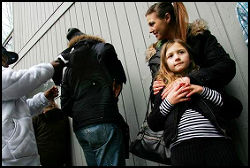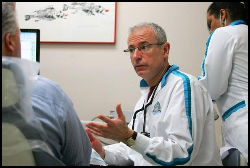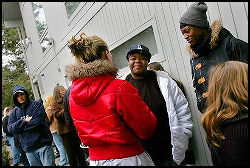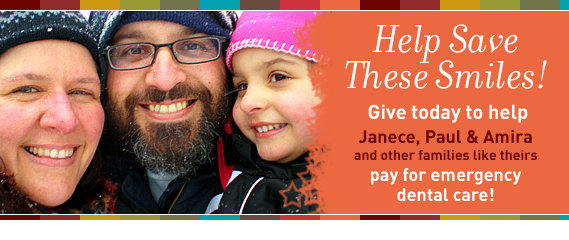A Profile on Dr. Michael Hrankowski, DDS

Dr. Hrankowski, a Seattle native, has been in private practice since 1982. He has earned degrees in both Psychology and Dentistry from the University of Washington and has also served as a dental school faculty member and clinical instructor.
To share his passion for dental excellence, Dr. Hrankowski has been published in various local and national journals and is often asked to speak to groups of other dental and affiliated healthcare professionals. He has lectured nationally and internationally and has mentored a dental study group in Berlin, Germany.
Dr. Hrankowski's professional affiliations include the American Academy of Cosmetic Dentistry, and the Academy of R.V. Tucker Study Clubs. He has also been a restorative advisor to the Seattle Study Club. Additionally, Dr. Hrankowski is principal in his company, Clinical Coaching Associates, which specializes in helping other dentists to improve their clinical skills.
Dr. Hrankowski is himself a student of dentistry. He has studied at the Center for Professional Development in Scottsdale, Arizona. He has completed all six week-long courses at the L.D. Pankey Institute for Advanced Dental Education in Key Biscayne, Florida and is a Mentor with the Creating Restorative Excellence program in Seattle. His commitment to continuing education exceeds the required amount by more than three times the annual requirement.
Dr. Hrankowski's current practice, Edmonds Woodway Dental Care, is located north of Seattle in Edmonds, WA.
Healthcare. Insurance. Universal. Private. Single-payer. Through the media and our personal experiences, we all know that our healthcare system is suffering. We have too many people without access to healthcare and still more who have access but are still driven to poverty due to the overwhelming costs still not covered by their health insurance plans. The topic has been a national debate for years and yet, even though there are now glimmers of hope, the crisis is worse than ever with millions falling through the cracks.
HOLISTIC DENTAL CARE
by Dr. Michael HrankowskiIn my conversations with patients and other health care practitioners, I have found a great deal of confusion and debate over the meaning of the "holism" as it relates to one's health. What follows are my personal views on the subject.
The dictionary defines holism as: "The principle that a part is only understandable in relationship to the whole." Therefore, any truly holistic discipline must have as its basis, the treatment of the whole person. But what constitutes the "whole person?"
In his book Beyond Illness, Dr. Larry Dossey states: "We can no longer continue to view the body as a dualistic entity consisting of separate Matter & Mind, In this view of Holism, one sees humans on three levels: Body/Mind/Spirit. Holism therefore must treat and support all three levels."
The Spiritual scheme is inclusive of the Material but not the Spiritual. In dealing with the Physical/Material, it does not include either the Mental or the Spiritual and is thus the most limited scheme.
Most modern Western medicine is primarily aimed at the Physical/Material realm and excludes the other two. Even some avowed holistic practitioners who use only "natural" remedies are in reality still only treating the Physical and are, therefore, not true holists under this definition. Just because one practitioner might prescribe aspirin and another, willow bark tea, does not necessarily mean that one is a holist and the other not. The essence of holism does not come from technique.
This is not meant as a criticism of "natural" methods of treatment, but I point it out so that we can have a clearer understanding of the terminology involved.
Therefore, in order to be truly holistic, I would argue that the practitioner must use a complimentary approach, treating each realm as it is appropriate for each patient. I believe this to be a valid and reasonable approach and it is what I endeavor to do with my patients whenever possible.
Historically, dentistry has been a very mechanistic form of health care. People are so conditioned to this paradigm that they call up on the phone and ask questions such as "How much would you charge me to get a cleaning, or get a filling or get a crown," as if it were some commodity sitting on the shelf at K-Mart. Only a few people ever ask the more important questions such as: "What is the doctor's philosophy of treatment?" or "How many patients does the doctor see at a time?" or "What type of relationships does the doctor strive to develop with a patient?" People don't ask because they don't know to ask.
Holism in dentistry is a philosophy and a way of practice. It means patients, their overall health & well-being, must be foremost in the practitioner's mind. Yes, it also means cleanings, fillings and crowns. These are often inescapable outcomes to unchecked dental disease - but, under what context are these services being provided?
Too often the dentist views a patient as just a mouth. The goal becomes to fix as many mouths as possible in as short a time as possible. The patient becomes the object of the "fix" instead of a participant in the treatment; how degrading it is for a patient to experience that type of environment ? Where is the quality, attention and care when the dentist is busy running from room to room? The patients suffer.
But the dentist also suffers. How satisfying can it be for a dentist who sees 40 patients a day? What kinds of relationships can that dentist build with his/her patients? How can that dentist spend the necessary time with the patient to really know the patient's needs and desires?
In a truly health-centered, holistic dental practice, each patient should be seen as a unique, whole person. Each patient should be treated with dignity and respect. The dentist gives each patient his/her most important gift: Time.
This taking the time to listen; taking the time to do a complete examination; taking the time to teach the causes of existing and potential dental problems and taking the time to explain alternative treatments and modes of prevention. It means that each patient be given the opportunity to choose the highest level of health consistent with their values and life circumstances.
It is not only the patient who benefits from this approach, but also the dental team, who is also enriched in the process. The dentist and staff receive in return a sense of having made a difference in people's lives.
I know from experience the satisfaction that is to be had from practicing holistically. I have done it both ways. In this type of practice, everyone benefits. The traditional roles of doctor and patient blur and each ministers to the other.
Therefore, holism is about relationships. Relationships with others and with one's self. When these relationships are good, healing takes place and everyone wins.
A crucial facet of healthcare often missing from our debate on the crisis is dental care. Dental health is central to our physical health and yet is often overlooked. When dental health deteriorates and oral decay begins to spread, the effect on the body is immediate and systemic, with negative impacts that range from lowered immune resistance all the way up to fatal heart or brain disease. (Read more about the tragic death of a young boy from tooth decay here.) In addition, a smile is a person's first interaction with and impression to the world. When the smile is damaged, so is self-confidence and the perception others have of the person's worth. Most often, when self-confidence is lost or others negatively judge the person, lost too is the person's ability to be their best, to contribute, impact and make a difference in their communities.
This past February, on a cold Saturday morning, Dr. Michael Hrankowski opened the doors of his dental office - Edmonds Woodway Dental Care - to provide free treatment in an event he named the "Day of Caring". Fueled by his continuing commitment to give back to his local community, Dr. Hrankowski organized the "Day of Caring" event and notified local news media in an effort to let the community know about his offering.
He and his team expected a good response. But when they arrived that morning, a surprise was waiting for them. A line that had begun forming in front of their office in the early hours was continuing to grow. When they opened the door at 9am, the line was over 100 people long. People came from miles away in hopes of getting in.

Focusing on the most critical procedures that could be completed on the same day, Dr. Hrankowski and his team worked straight through the day.

Even though they processed as many as they could, they still had to turn away nearly half of the people who had lined up. Dr. Hrankowski's dental assistant, Denise, expressed how difficult it was to not be able to help everyone who had come seeking help.

The kindness expressed that day didn't stop with Dr. Hrankowski and his staff. The Everett Herald reports this story about those in line: "When staff began turning people away, no one hesitated to let an older woman move to the front of the line..."
Dr. Hrankowski and his team are already thinking about and planning for another "Day of Caring" in the near future.
Dr. Hrankowski and his team understand the crucial role dental issues play in a person's overall health. They work hard to not only provide the kind of professional and personal care that will allow their patients to achieve and maintain healthy teeth and vibrant smiles, but they also address the important emotional considerations of the patient's quality of life and personal self-esteem.
When you first walk into Dr. Hrankowski's office, you will see a framed mission statement hanging on the wall:
We believe in the value and sanctity of the individual, knowing each person is worthy of being treated with the utmost dignity and respect.
We believe in an ongoing process of education, both for ourselves and for those who entrust their care to us,; for it is only through education that we may grow.
We are committed to excellence in all facets of this art and science. We wish each person a level of care that can bring freedom from the continuing cycle of dental breakdown which most people experience.
We acknowledge each person’s right to make informed decisions regarding his or her own health. We pledge to provide a safe environment, and an atmosphere of acceptance, care and support.
We nurture the belief that a mouth properly restored and maintained free of disease can significantly improve one’s self esteem and lead to a higher quality of life.
This statement is more than nice sentiments - it is a mission that drives Dr. Hrankowski to donate a week or more every year to providing free dental services in the desperately poor areas of Haiti and Jamaica and create a "Day Of Caring" to offer free help to the needy in his own community.
In the national search to provide answers to America's healthcare crisis, Dr. Hrankowski and his staff provide an inspiring model of provider/patient interaction and an effective example of local contribution for other healthcare professionals to follow.
Source(s):
The Everett Herald
Photo Credit: Mark Mulligan / The Herald
FRIEND OF A FRIEND HEALTHCARE INITIATIVE
Today I'm very happy to introduce my Friend Of A Friend Healthcare Initiative.
There are over 44 million Americans who are without healthcare. You know some of them. They are your coworkers, your friends, your family - maybe even you.
Today I'm coming to you on behalf of my own friends, Janece and Paul, who find themselves in the middle of a serious dental health crisis without the resources to pay for medical treatment.
We can't immediately help everyone, but we can make a difference for their family, and maybe many others.

